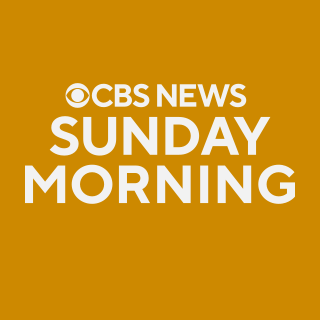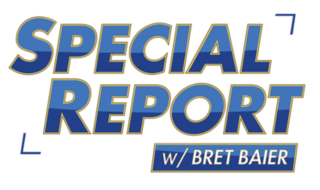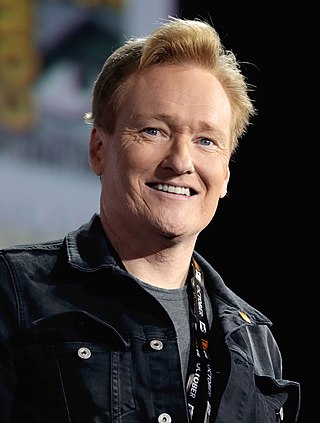Related Research Articles

Late Night with David Letterman is an American television talk show broadcast by NBC. The show is the first installment of the Late Night. Hosted by David Letterman, it aired from February 1, 1982 to June 25, 1993, and was replaced by Late Night with Conan O'Brien.

Geraldo Rivera is an American journalist, attorney, author, and political commentator who worked at the Fox News Channel from 2001 to 2023. He hosted the tabloid talk show Geraldo from 1987 to 1998. He gained publicity with the live 1986 TV special The Mystery of Al Capone's Vaults. Rivera hosted the news magazine program Geraldo at Large, hosts the occasional broadcast of Geraldo Rivera Reports. He served as a rotating co-host of The Five from 2022 to 2023. As of February 2024, Rivera retains the spot of correspondent-at-large with NewsNation.

Late Night with Conan O'Brien is an American television talk show broadcast by NBC. The show is the second installment of the Late Night. Hosted by Conan O'Brien, it aired from September 13, 1993 to February 20, 2009, replacing Late Night with David Letterman and was replaced by Late Night with Jimmy Fallon. The show featured varied comedic material, celebrity interviews, and musical and comedy performances. Late Night aired weeknights at 12:37 am Eastern/11:37 pm Central and 12:37 am Mountain in the United States. From 1993 until 2000, Andy Richter served as O'Brien's sidekick; following his departure, O'Brien was the show's sole featured performer. The show's house musical act was The Max Weinberg 7 and led by E Street Band drummer Max Weinberg.

Dennis Michael Miller is an American political commentator, stand-up comedian, talk show host, writer, actor and former sportscaster.

Paul Krassner was an American writer and satirist. He was the founder, editor, and a frequent contributor to the freethought magazine The Realist, first published in 1958. Krassner became a key figure in the counterculture of the 1960s as a member of Ken Kesey's Merry Pranksters and a founding member of the Yippies, a term he is credited with coining.

James Talmadge Brown is an American sportscaster known for being the studio host of The James Brown Show and The NFL Today on CBS Sports. He is also a Special Correspondent for CBS News.

The Insider is an American syndicated newsmagazine television program that was distributed by CBS Television Distribution. The program premiered in first-run syndication on September 13, 2004 and ended on September 9, 2017, as a spin-off of Entertainment Tonight, which originated the concept as a segment that took viewers "behind closed doors" and gave them "inside" information on stories and topics of interest from throughout the entertainment industry.

Good News Week is an Australian satirical panel game show hosted by Paul McDermott that aired from 19 April 1996 to 27 May 2000, and 11 February 2008 to 28 April 2012. The show's initial run aired on ABC until being bought by Network Ten in 1999. The show was revived for its second run when the 2007–2008 Writers Guild of America strike caused many of Network Ten's imported US programs to cease production.
Patrick John O'Brien is an American author and radio host, best known for his work as a sportscaster with CBS Sports from 1981 to 1997, as well as his work as the anchor and host of Access Hollywood from 1997 to 2004, and The Insider from 2004 to 2008.

Inside Edition is an American newsmagazine television program that is distributed in first-run syndication by CBS Media Ventures. Having premiered on January 9, 1989, it is the longest-running syndicated-newsmagazine program that is not strictly focused on hard news. Though it does feature the latter, the rest of each day's edition mainly features a mix of infotainment stories, entertainment news and gossip, scandals, true-crime stories and lifestyle features.

CBS News Sunday Morning is an American television newsmagazine that has aired on CBS since January 28, 1979. Created by Robert Northshield and E.S. "Bud" Lamoreaux III, and original host Charles Kuralt, the 90-minute program currently airs Sundays between 9:00 a.m. to 10:30 a.m. EST, and between 6:00 a.m. to 7:30 a.m. PST. Since October 9, 2016, the program has been hosted by Jane Pauley, who also hosts news segments. Her predecessor, Charles Osgood, hosted Sunday Morning for twenty-two years after taking over from Kuralt on April 10, 1994.
The Late Show is an American late-night talk show and the first television program broadcast on the then-new Fox Network. Hosted by comic actress Joan Rivers, it debuted on October 9, 1986, under the title The Late Show Starring Joan Rivers. It is also the first late-night show hosted by Arsenio Hall.

Special Report with Bret Baier is an American television news and political commentary program, hosted by Bret Baier since 2009, that airs on Fox News Channel. It is broadcast live each Monday through Friday at 6:00 p.m. ET. The program focuses on both reporting and analysis of the day's events, with a primary focus on national American political news. The show has been a part of the Fox News program lineup since 1998 and is the number one cable news broadcast in its time slot.

Conan Christopher O'Brien is an American television host, comedian, writer, and producer. He is best known for having hosted late-night talk shows, beginning with Late Night with Conan O'Brien (1993–2009) and The Tonight Show with Conan O'Brien (2009–2010) on the NBC television network, and Conan (2010–2021) on the cable channel TBS. Before his hosting career, O'Brien was a writer for the NBC sketch comedy series Saturday Night Live from 1988 to 1991, and the Fox animated sitcom The Simpsons from 1991 to 1993. He has also been host of the podcast series Conan O'Brien Needs a Friend since 2018 and starred in the 2024 travel show Conan O'Brien Must Go on Max.
Keith Morrison is a Canadian broadcast journalist. Since 1995, he has been a correspondent for Dateline NBC.
Helen Vivian "Nell" Scovell is an American television and magazine writer, and producer. She is the creator of the television series Sabrina the Teenage Witch, which aired on ABC and The WB from 1996 until 2003 and co-author of the book Lean In.

Andy Cowan is an American writer and script consultant for television and other media. He is the creator and host of the comedy/therapy podcast, The Neurotic Vaccine, launched in 2022 from Benztown + McVay Media Podcast Networks. The Neurotic Vaccine wound up landing among the top comedy interview podcasts in the U.S., Canada, Mexico, Italy, Greece, Denmark, Ireland, and Romania, and in 2023 was a multiple final Quill (podcasting) Award nominee for Best New Podcast and Best Comedy Podcast. From 2010–2011, he co-hosted his radio comedy therapy talk show, Up & Down Guys, on KPFK 90.7 FM in Los Angeles.
NBC made history in the 1980s with an announcerless telecast, which was a one-shot experiment credited to Don Ohlmeyer, between the Jets and Dolphins in Miami on December 20, 1980), as well as a single-announcer telecast, coverage of the Canadian Football League during the 1982 players' strike, and even the first female play-by-play football announcer, Gayle Sierens.
References
- 1 2 3 4 5 6 7 8 9 10 11 12 13 14
- Paul Krassner "An Insider's Report on the Death of 'Wilton North'" Archived 2012-12-23 at the Wayback Machine , from Los Angeles Times , 2/14/1988 (via LaneSarasohn.com)
- Paul Krassner (February 14, 1988). "An Insider's Report on the Death of 'Wilton North'" – via LA Times.
- ↑ Ron Stringer O Brother, Where Art Thou? screening laweekly.com
- ↑ "The News Arrives in 2 New Packages," from Los Angeles Times, 11/30/1987
- ↑ "The Late Show with Arsenio Hall: Final Show" on YouTube
- ↑ "The News Arrives in 2 New Packages," from Los Angeles Times, 11/30/1987
- 1 2 Hofstede, David: "What Were They Thinking?: The 100 Dumbest Events in Television History", pp. 78–80. VNU, Inc., 2004
- ↑
- Scovell, Nell (Dec 11, 2012). "Inside the Greatest Writers Room You've Never Heard Of". Archived from the original on January 30, 2014. Retrieved Aug 9, 2013.
- Inside the Greatest Writers Room You’ve Never Heard Of by Nell Scovell
- 1 2 "Fox Broadcasting Postpones Debut of 'Wilton North,'" from Los Angeles Times, 12/1/1987
- ↑ "'Wilton North' makes first report tonight," from Houston Chronicle, 12/11/1987
- ↑ "The Case Of The Good Tv Show-it's A `Mystery`" from Chicago Tribune, 12/17/1987
- ↑ "Fox Tries Late-night Wit Again With 'Wilton North'," from Philadelphia Inquirer, 12/18/1987
- ↑ "Fox Planning New Late-Night Show to Replace Canceled 'Wilton North Report'," from Los Angeles Times, 1/8/1988
- ↑ "The Wrong Man in the Right Place at the Right Time," from Spy magazine, 9/1990 (via SCTVGuide.ca)
- ↑ "Interview: Conan O'Brien," from The A.V. Club, 8/30/2006
- ↑ "Danny Zuker". IMDb.
- ↑ Parker, Brinton (6 July 2015). "Donald Trump Got Into a Twitter Fight and Got Burned So Bad".